Defiant US fraudster Allen Stanford vows to clear name
- Published
Allen Stanford spoke exclusively to the BBC from prison after being jailed for investment fraud
In his first interview since being indicted in 2009 for masterminding the second-largest Ponzi scheme in history, convicted US fraudster Allen Stanford has told the BBC he is innocent.
"I didn't do anything wrong" said the 65-year-old Texan, speaking from a maximum security penitentiary in Florida. "Will I apologise? No. Mark my words... I am going to walk out the doors of this place a free man."
Stanford says his life behind bars is "hell". He describes being assaulted by fellow inmates in 2009, saying the treatment he received by the authorities after the attack was "barbaric".
Stanford's lack of contrition is sure to anger the victims of his fraud, thousands of whom have little hope of ever recovering the money they lost in his $7bn (£5bn) scam.
The former Houston banker was handed a 110-year sentence in March 2012 on fraud, conspiracy and obstruction charges after the Securities and Exchange Commission (SEC) shut down his global empire.
Read more: 'Embarrassment to England cricket makes me sad'
Prosecutors said the former billionaire had run a massive, two-decade scam centred on the sale of certificates of deposit. They alleged he was a swindler, misusing the money of thousands of clients to fund risky investments and an opulent lifestyle, including the sponsorship of cricket tournaments.
Once considered one of the richest men in the world, Stanford has always insisted he is is not a conman, blaming the federal government, the SEC and a court-appointed receiver for tearing down his business empire and preventing investors from getting their money back. In October an appeals court rejected his bid to overturn his conviction but Stanford has now filed for a rehearing.
"I am going to win this" he said. "And I'm going to win for the people who were harmed also."

Stanford was assaulted in prison in 2009
Stanford is housed in the high-security Coleman II federal prison in Sumterville, Florida. He is not eligible for release before 2105 and for the last three years he has been helping a fellow inmate write a book, Brutal Takeover, detailing his demise.
It says he was made a scapegoat by the US authorities for the financial crisis in 2008, and following their failure to detect infamous financier Bernard Madoff's record $65bn fraud.
"I am in this situation caused by the wrongful actions of the US government and particularly the SEC," he insists.
"There is no question that I was a scapegoat for what happened in 2008 and 2009, post-Madoff... They needed a head on a block."
Stanford on his conviction
Stanford was born into a lower middle-class family in the small Texan town of Mexia in 1950. After his early business ventures ended in failure, he founded Stanford International Bank in 1991 on Antigua, laying the foundation of his empire and becoming the island's largest employer. At its most successful, the Stanford Financial Group claimed clients from 140 countries with assets of $50bn under management.
By 2008, Stanford was one of the richest men in America, worth an estimated $2.2bn, and living an extravagant, jet-setting lifestyle in which he enjoyed power and privilege.
But amid suspicions he was treating the savings of depositors as his own personal piggybank, and using certificates of deposit sold as safe investments for far riskier private equity and real estate, the SEC filed a civil complaint, accusing Stanford of fleecing about 25,000 investors worldwide. Jim Davis - Stanford's right-hand man since the 1980s and the company's chief financial officer - then agreed to testify in exchange for a reduced sentence.
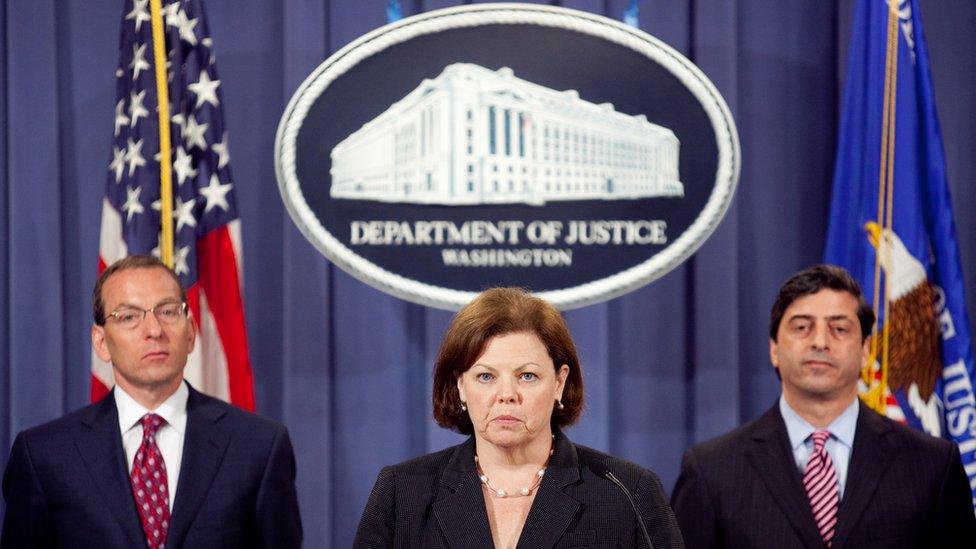
US prosecutors alleged that 30,000 people were victims of his Ponzi scheme
In 2012 Stanford was convicted on 13 of 14 criminal charges against him. Calling Stanford arrogant and without remorse, prosecutors asked for a 230-year sentence, with defence lawyers arguing for a lenient term of 44 months.
'Wildly delusional'
Throughout his trial, he steadfastly maintained his innocence, insisting his businesses were legitimate. He said that Mr Davis's testimony was false, and that he had been scapegoated by the authorities, but the jury rejected his story, and believed Mr Davis. Federal prosecutor William J Stellmach called Stanford's version of events "obscene". "This is a man utterly without remorse," he said. "From beginning to end, he treated all of his victims as roadkill."
"I did not do anything wrong," Stanford counters. "When I was sentenced I got up before the judge and the packed courtroom, and I looked everyone in the eye and I said 'I did not do what you have accused me of doing, and I am not guilty but I'm going to prison and if I go to prison for the rest of my life, I will go to bed in a prison cell at peace with myself knowing that I never did anything illegal or unethical'. I never stole a damn penny from anyone in business in my life. I was audited every single year for 12 years, prior to the SEC coming in, by the Internal Revenue Service."
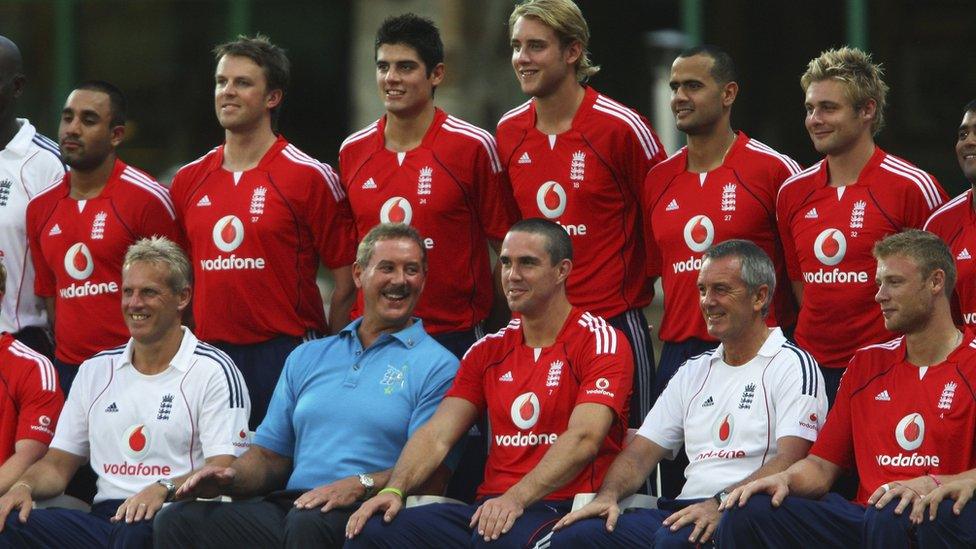
Stanford (centre, dressed in blue) signed lucrative contracts with the England cricket team
"This is the biggest unjust act ever committed by the SEC and probably by the Department of Justice in the history of the US. As I am sitting here right now, and as God is my witness, I did not misspend one penny ever. What I earned, I earned legally, ethically, honestly.
"If I was in somebody else's shoes and for seven years all I had seen and heard was 'this guy is the biggest Ponzi schemer that ever lived, he stole money from widows and orphans', yeah, than I would probably think, 'Allen Stanford got what he probably deserved, and he's a sorry son of a bitch'.
"But on the other hand if you take the time to read the book, you understand that there is another side to this story, not just the government propaganda of disinformation, their trawling of lies. They have hood-winked everybody, it will shock you. This story is as big as it gets… what anybody thinks of me quite frankly at this point in my life, I don't give a damn."
Stanford on the fraud victims
To date only around $292m has been recovered, with $73m returned to Stanford's estimated 28,000 investors. Many are elderly and more than 170 have died since the scandal broke in 2009. Stanford is highly critical of the way the receivership has been handled, describing it as "a court-sanctioned theft of unimaginable proportions".
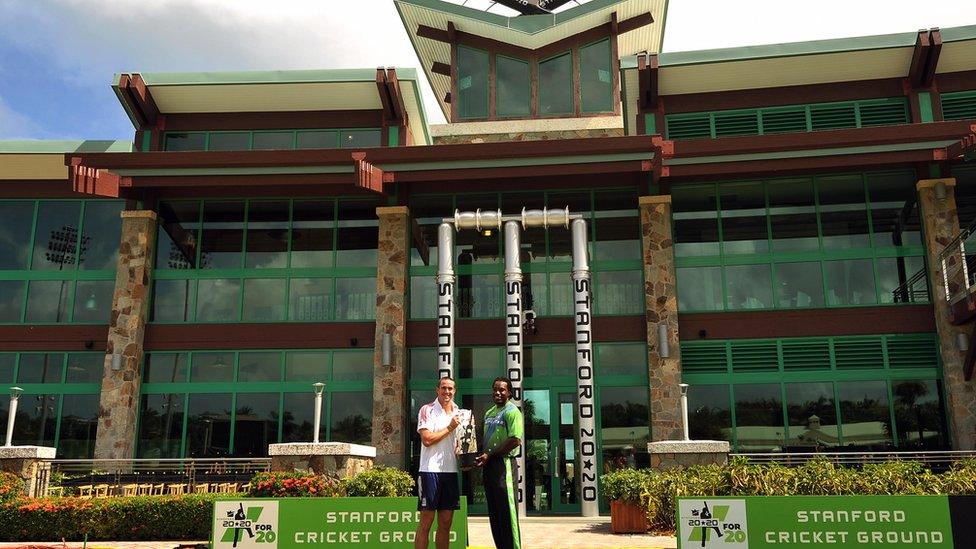
Stanford spent millions building a cricket ground in Antigua, which he gave his own name
Some $90m has been paid in fees and expenses to receiver Ralph Janvey and other professionals working on the case. "My business was effectively ruined, with assets sold at fire sale prices immediately under a receivership, all before I was ever convicted," says Stanford. "There had been no proof of fraud, no proof of wrongdoing, assets were frozen, were starting to be spent on attorneys, accountants and other so-called professionals to the tune of hundreds of millions of dollars. What if I had been found not guilty? Who was going to undo the damage that had been done? I had to be found guilty.
"Let me tell you what my feelings are to the people who have been impacted by this in a negative way because of the actions of the SEC, the Department of Justice, and the US government. I am so incredibly sad for what happened to you and I cannot do anything about that, but do I owe you an apology? No. Will I apologise? No. Will the government ever apologise? I don't know. But they are going to financially make whole these people. Can they undo what they have done? Can they take back the seven years of my life, the seven years of damage to these other real victims? No. But nobody lost a single dollar until the government of the US stepped in, and only then did anybody suffer any financial harm."
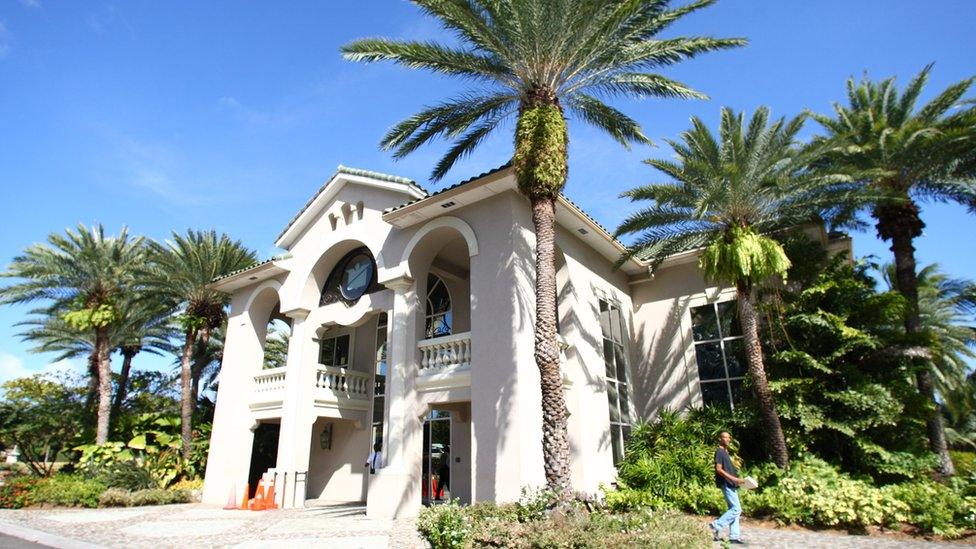
The Stanford International Bank was also headquartered on the Caribbean island
In a statement, a law firm acting on behalf of US victims told the BBC, "Allen Stanford, the group of brokers, and third party institutions supporting the Stanford Platform have destroyed the lives of working people. Victims are left wondering, where does this story end? No one knows what will happen and who will recover what monies."
In a statement, Mr Janvey said his work was court-approved and complex, and that $200m of frozen assets in Switzerland could not be released until Stanford's appeals were concluded. "It is Stanford's wildly delusional persistence in his innocence that is the major immediate stumbling block to the return of those assets…he stands convicted of a crime of epic proportions," he said.
Stanford on his assault and 'barbaric' treatment
In September 2009 while awaiting trial, Stanford was severely beaten by fellow inmates. He was transferred to a federal prison medical facility as the result of an addiction to anti-depressants, which he developed after the assault. His lawyers claimed this led to memory loss. After two year delay, a judge determined he was fit to stand trial.
"I was on the phone trying to reach my daughter inside a four-man cell that they had crammed 10 of us into, and I was attacked from behind. Some guys slammed my head into a concrete wall, split my skull open and then proceeded to put me in a choke hold... and then they stomped on my face and broke 32 bones in my head and face... After my brain swelling went away five days later they did an eight-hour operation to repair the damage. Thirty-two fractures were put back together with mesh and titanium screws. They then put me into a 7 by 6 ft 'hole' - that's the slang we use for the special housing unit where they separate you from everyone else. And I was left there for a month to recover and I saw the doctor one time in that 30 days to remove some stitches. I was given no antibiotics and no painkillers. I was put on psychotropic drugs which is the worst thing you can do for someone with a severe brain injury. I had severe concussion and my skull was cracked.
"I was pre-trial, I was presumed innocent… I was denied bail and my treatment, I would call it barbaric. It was something you'd think you'd receive if you were in North Korea or Iran or Russia or somewhere, but not the US.
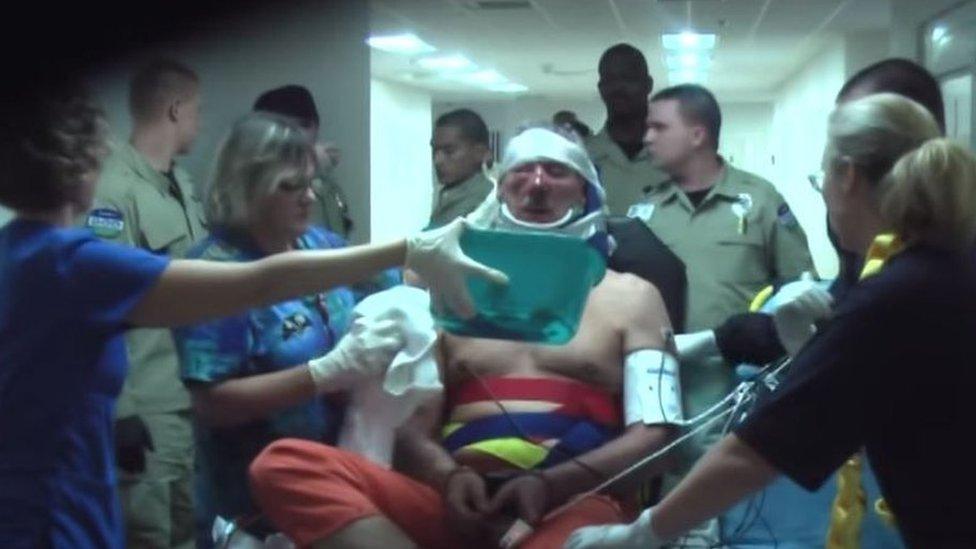
Stanford appeared bloodied and handcuffed in footage taken after the 2009 prison assault
"My memory began to go on me... I was having residual bleeding on my temporal lobe which they refused to do an MRI on and refused to give me proper neurological care on.
Stanford on prison life
"It's really beyond comprehension when you're in a penitentiary - there's four levels of custody: camp, low, medium - and I'm in the maximum security setting - and I'll just use some penitentiary language here; a penitentiary is violent... and it is a violent existence, and it will test everything you are made of.
"I have been able to weather this storm from hell probably better than most people could have, and you don't really know what you're made of until these things unfortunately come your way. I certainly never thought I'd spend now nearly seven years of my life in a US penitentiary and be subjected to things that are really horrific but mentally I'm back, I think, close to where I was before all this started. Physically I'm doing very well, thank God, and I'm fighting every single day. I am not going to lose this, this was a wrongful prosecution and I am going to win.
"There's a points system in prison in the US. It goes from 1 to 46, 46 being the most violent and most lengthy of criminal history, 1 being the least. I am a 1. I've been told I am the lowest points-system inmate in the whole prison. I would normally qualify for a camp or a 'low' prison, but they've stuck me here... The purpose for that - there's no question - is to make it more difficult to continue to fight. This is not conspiratorial, conjecture or whining - I'm certainly not whining about a damn thing.
"I have seen people stabbed I have seen people beaten senseless. I have seen guards attacked, inmates attacked, I've seen some pretty bad things happen. I've been in the middle of a riot, 100 guys right in the middle of a big riot, then they bring in the real guns and shoot with real bullets, I've pretty much seen it all.
"I read a Bible verse every morning... without that belief I could not let this anger go, I could not let this hate that boils up in me from time to time go. So it comes and then I just let it go because ultimately you hurt yourself, it will eat you alive and I have seen it do that to a number of guys in here… I miss my freedom. Like anybody in a penitentiary, you cannot even begin to tell someone what it's like to lose your freedom until you have lost your freedom.
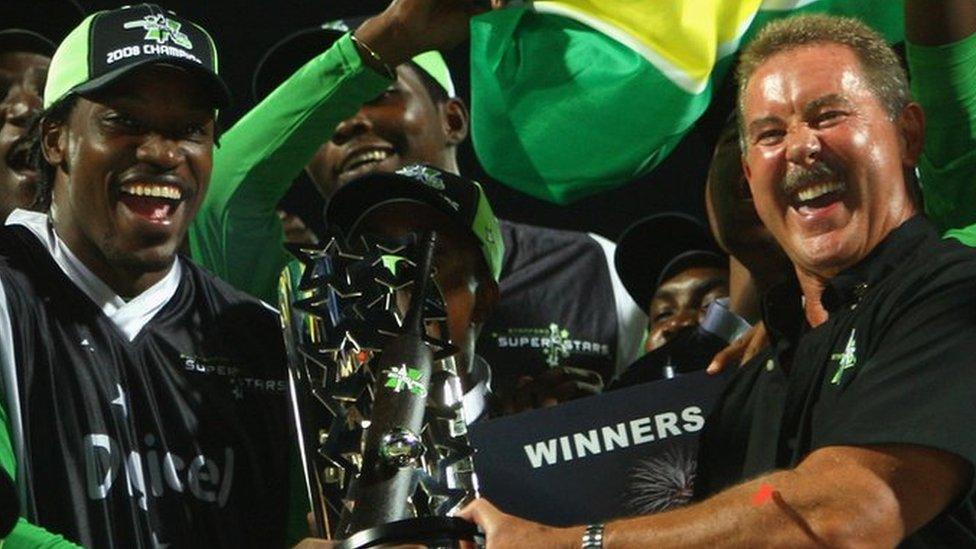
The winning team shared $20m in prize money for Stanford's 2009 cricket tournament
Stanford on his downfall
"It is hard to believe every single, waking, moment, that I am inside this penitentiary, and now going on almost seven years of this hell it is still hard to realise. But as they do say, you either become stronger or weaker. In my case, I think I've shown I've become a stronger person and I've been supported by my family, and a handful of friends.
"The darkest moment was probably when I was... coming off this addiction that the government got me on... the government turns me into a damn drug addict. While I was getting off these psychotropics, my mother moved up to to visit me... and I was having trouble remembering that both my younger brothers had died tragically years ago, and that was a very difficult time for her emotionally."
Stanford on his appeal
After serving three of his 110 years behind bars, Stanford filed an appeal on his own behalf, without an attorney. In October 2015, a court rejected 10 arguments, including that he was not competent to stand trial, that the SEC did not have jurisdiction over his offshore business, that the government did not prove its case, that the sentence was too long, and that the trial judge was biased toward prosecutors.
"We find no evidence that the district court was partial to the government in derogation of Stanford's right to a fair trial under the Constitution," the circuit judge wrote. Stanford was found to have manipulated financial reports to show fake profits, bribed an Antiguan official, impeded SEC scrutiny and orchestrated a fraudulent financial empire. He denies any wrongdoing and has lodged a further appeal.

Stanford once landed his helicopter in the middle at London's historic Lord's cricket ground
"I was not fit to go to trial, I did not have the preparatory time. All four of my attorneys... unfortunately were spineless. They did they best they could. They didn't even bring up issues that should have been addressed. They didn't understand what they were really doing. It was an enormously complex case, the government had three and a half years, they used Stanford money, receiverships, assets, civil investigatory powers to get and do things illegally to get me and prosecute me.
'Never any issues'
"There was no misrepresentation of any annual report. When 2009 rolled around and the financial crisis was at its worst, when the SEC came in, we were under the regulatory look-and-see of 14 countries and 70 different regulatory and other bodies that examine your business, including our insurance underwriters who have to do risk audits of the way you manage your assets. We never had any issues other than the normal 'you can do better here and there' - nothing of any significance, never had any issues ever.
"The whole thing about bribes was manipulated by the SEC… The SEC did not have the regulatory authority nor the jurisdiction to do what they were wanting us to do, but to bend over backwards we invited them to come and see for themselves. The Antiguan authorities then agreed they would send with them their regulators, their internal auditors to go look at the books with them should they choose to do that - both times they said no.
"I work non-stop, I'm working seven days a week on my case, that's all I do. I just work on my case. I don't think about dying in prison, my thought is on winning, I plan to win.
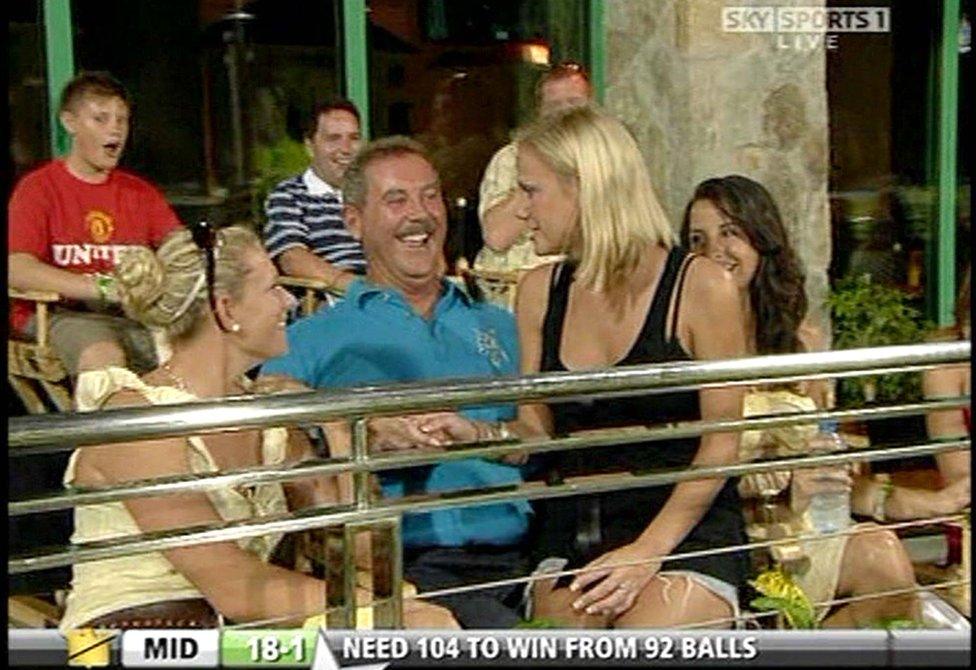
The tycoon's behaviour with the wives of the England cricket team caused uproar in the British media
Stanford on his family
"What happened to my six children was wrong, terribly wrong… They got put out on the street, they got the silver spoon taken out of their mouth, their billionaire father who was providing for them that got yanked out from underneath them, they did not whine, they did not cry, they did not complain, they sucked it up and showed me they had the grit and determination to carry on. And it's just been an awe-inspiring thing for me to watch my children all six of them - how they have been able to show me what they're made of.
"I am sad for what they have had to go through but I don't feel guilty for what they have had to go through. I didn't cause that. What I have a guilt for is that before any of this happened I didn't spend the time I should have spent with my children, instead I spent it in my business… But in terms of what's happened, I have nobody to be apologetic to, I have nothing to apologise for, I have done nothing wrong.
Stanford on his former lifestyle
"I owned six jets, I had a Global Express, two Gulf Streams and three Hawker jets. All of those were corporate aircraft, all used for business purposes. Without that I couldn't have done what I did, which was travel constantly, and I worked my rear end off. So to that end I needed the aeroplanes. I was one of the wealthiest men on the planet and anybody in my position would have his own aeroplane. You're going to have planes because we had business in 140 countries and offices in 14 countries. The opulent lifestyle is really a funny thing to me. What is opulent? I had a 112ft sports yacht. Is that a big boat? Of course it is, if you have a 14ft boat as a dream boat. But if you are Larry Ellison and you've got four 300ft boats maybe it's no more than a tender. It's all relevant. I lived very modestly in terms of how I could have lived. My lifestyle in terms of my profile was probably much bigger than how I actually lived personally.
Stanford on the future
"Let's not talk about if, let's talk about when I'm released.
"I will go back to being who I was, but more in tune to what I do with my family and my children... I want to be back in the Caribbean, that's my favourite place in the world and I love the people in the West Indies, they're my second family. I love Antigua, I miss it greatly.
"I know it's going to happen, so it's not a dream, it's reality and it's right around the corner so yes, I think about it very, very often and I have a smile on my face, and I know it's going to happen. And I feel very confident it's going to happen very, very soon."
- Attribution
- Published20 April 2015
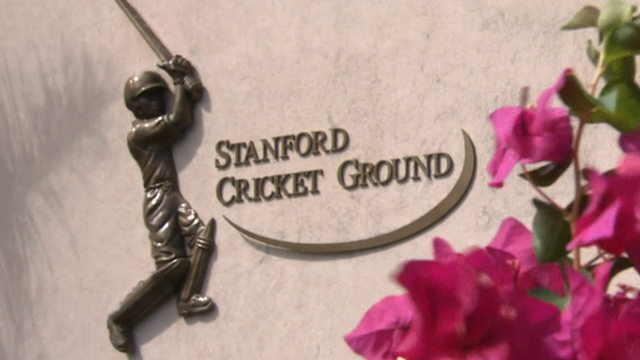
- Published14 June 2012
![Allen Stanford at Lord's [11 June 2008]](https://ichef.bbci.co.uk/ace/standard/464/mcs/media/images/58914000/jpg/_58914123_stanford.jpg)